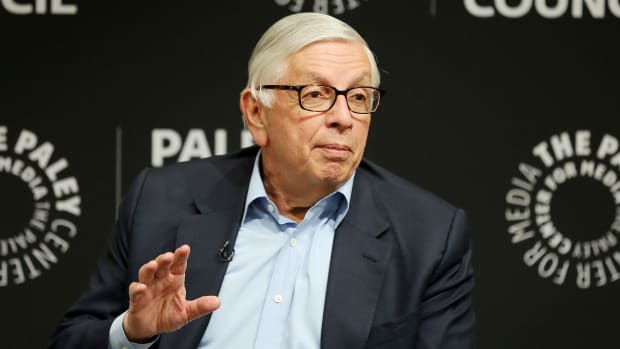Stern played an integral role in helping establish a league that drastically progressed over the years due to his leadership while commissioner.

There is a generation—if you are reading this, perhaps you’re a part of one of them—that sees sports commissioners as little more than stewards. Mete out a few fines, hand down a handful of suspensions, deal with a steady stream of criticism of officiating, all while watching network executives club each other to fork over multi-billion dollar contracts.
David Stern, the former NBA commissioner who
passed away on Wednesday, wasn’t that. Before the NBA was a powerful global presence, before the price of television contracts soared and player salaries became the envy of the four major sports, it, well, wasn’t. The NBA that Stern took over in 1984 was floundering, financially strapped, a distant competitor to the NFL and Major League Baseball. In the 1980-81 season, 16 of the NBA’s 23 teams lost money. Teams averaged around 10,000 fans; Cleveland, then the NBA’s worst run team, sold just 28% of its seats.A year earlier, CBS elected to show Game 6 of the Finals on tape delay.
Contraction, if you can believe it, was being strongly considered.
The NBA didn’t need a steward—it needed a savior.
It got one in Stern, a mustached Manhattan lawyer, a progressive thinker who had worked for the NBA in various capacities since the late 1960s. It was Stern, then an executive vice-president, who worked to establish a salary cap in 1983, a move widely credited with saving seven teams from extinction. It was Stern who pushed the NBA into Europe, South America and the Far East, opening offices in 15 cities outside the U.S., signing television agreements with more than 200 countries, exposing the NBA to billions and creating the type of international influx that enriches the league today. It was Stern, a visionary in the television space, who invested heavily in NBA Entertainment, who promoted players over matchups, who targeted coveted younger demographics with teen-friendly programs like Inside Stuff.
“It was rare to see a leader with such great vision,” says Raptors president Masai Ujiri, “who then also executed it.”
There was a relentlessness to Stern, an unflinching belief that the NBA could emerge as the most popular sport, both domestically and abroad. He was a compassionate figure when he needed to be, hugging Magic Johnson on live TV, in 1992, after Johnson announced he had HIV to a world that feared everything to do with the disease. He was a disciplinarian when he had to be, like in 2004, when a brawl in Detroit spilled into the stands, creating the kind of violent visuals Stern badly wanted to have rooted out of the league. Stern issued some of the harshest penalties in NBA history after that, including benching Ron Artest for the remainder of the season—which amounted to an 86-game hit.
He clashed with players over the league’s salary structure, over bench wardrobe, always fiercely believing what he was doing was in the league’s best interest. And he was willing to listen. Billy King, the former Sixers GM, recalls the uproar caused by Allen Iverson’s foray into rap music in 2000. His debut single, “40 Bars,” was sharply criticized by women’s groups and the LGBT community. Stern himself issued a strongly worded statement against it.
That fall, Stern asked to meet with Iverson. Iverson, says King, didn’t want to go. “David had told him after they last met that if he had to call him to his office again, he was going to kick Allen out of the league,” King told SI.com. Iverson relented, and the two met. Iverson explained his thinking with the lyrics. He told Stern how he wanted to help his friends crack the music industry. Iverson issued a public apology. Stern decided that was enough.
“David didn’t care about the backlash,” King said. “He was going to do what he thought was right. He was going to protect the players. He was going to protect the game.”
Players, Stern long ago reasoned, were what was going to drive the NBA to unimaginable heights. Fans didn’t care about the laundry, they tuned in, bought tickets, gobbled up merchandise for the players that wore them. Stern brought the slam dunk and three-point contests to All-Star weekend to showcase the league’s younger stars. The Olympics' decision to allow NBA players to compete in 1992 offered Stern an opportunity to showcase the league to the world, and he seized on it. He likened the NBA’s business model to Disney’s, with arenas being theme parks.
“They have characters,” Stern told SI in 1991. “Mickey Mouse, Goofy. Our characters are named Magic and Michael [Jordan]. Disney sells apparel; we sell apparel. They make home videos; we make home videos.”
Said Jordan, “Without David Stern, the NBA would not be what it is today … his vision and leadership provided me with the global stage that allowed me to succeed. David had a deep love for the game of basketball and demanded excellence from those around him – and I admired him for that. I wouldn’t be where I am without him.”
There were failures, of course—no 30-year tenure would be without them. Stern presided over the worst referee scandal in league history and he must own how Donald Sterling was allowed to stick around as long as he did. He led the league into two game-killing lockouts and surrendered when the Sonics sought to relocate from Seattle. And there are L.A. fans still seething that Chris Paul never wore a Lakers uniform.
The successes, though, vastly overshadow the failures. What the NBA is today is what David Stern made it. What it can be is because of the path Stern put it. With bottomless passion and unrelenting drive, Stern pushed the NBA to once unimaginable heights. It’s a legacy few commissioners, if any, could hope to match.

Post a Comment
Thanks For Comment We Will Get You Back Soon.